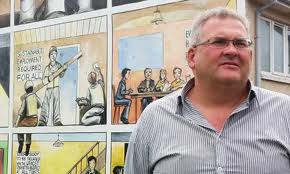Draw a Line Now
 Is it not strange that those who did not attend Sinn Fein’s conference entitled Belfast: A City of Equals in an Island of Equals at the Europa Hotel, have been able to label the event in so many ways? Those non-republicans who participated have been described as those having taken part in a ‘love in’ and of having being duped by Sinn Fein’s hypnotic abilities. As if Gerry Adam’s sat at the back slowly swinging his grandfather’s pocket watch and gently stating ‘look into my eyes!’ If anything the majority of those who spoke shared a common concern that Sinn Fein needed to adopt better listening skills and appreciate that there is more than their truth, history and victims. The event if anything provided for what were necessary but robust conversations. The brilliance of those conversations was not that they happened or that they were forceful but that they were mannerly. The possibility being provided to tell Sinn Fein how others see their approach and ideas as wrong or requiring much greater reflection.
Is it not strange that those who did not attend Sinn Fein’s conference entitled Belfast: A City of Equals in an Island of Equals at the Europa Hotel, have been able to label the event in so many ways? Those non-republicans who participated have been described as those having taken part in a ‘love in’ and of having being duped by Sinn Fein’s hypnotic abilities. As if Gerry Adam’s sat at the back slowly swinging his grandfather’s pocket watch and gently stating ‘look into my eyes!’ If anything the majority of those who spoke shared a common concern that Sinn Fein needed to adopt better listening skills and appreciate that there is more than their truth, history and victims. The event if anything provided for what were necessary but robust conversations. The brilliance of those conversations was not that they happened or that they were forceful but that they were mannerly. The possibility being provided to tell Sinn Fein how others see their approach and ideas as wrong or requiring much greater reflection.
 One respondent reminded Sinn Fein that the Union Flag drapes the coffins of loved ones returning for war in Iraq and Afghanistan and wondered if they really understood the significance of that when voting for its removal from City Hall. Others embraced the idea of Unionist alienation not in itself a flaw in the Unionist character but in the action and discourse of republicanism. I presented quotes from people who questioned Sinn Fein’s motives, language and behaviour. If this was a ‘love in’ I would not have liked to have seen the fight.
One respondent reminded Sinn Fein that the Union Flag drapes the coffins of loved ones returning for war in Iraq and Afghanistan and wondered if they really understood the significance of that when voting for its removal from City Hall. Others embraced the idea of Unionist alienation not in itself a flaw in the Unionist character but in the action and discourse of republicanism. I presented quotes from people who questioned Sinn Fein’s motives, language and behaviour. If this was a ‘love in’ I would not have liked to have seen the fight.
One of the more forceful comments was made by Matt Baggott who explained that “At the moment we are spending huge resources because we are required by law to relentlessly go back into the 70s, 80s and 90s whether that is through inquests or inquiries.” One could sense the frustration of trying to roll out civilian policing but being made to constantly go back to Pol Pot’s Year Zero. His contribution in itself gets to the nub of the question about the past. When oh when does it stop?
We have a dangerous system at present regarding the past which is based upon the flawed architecture of rearward actions. To put it simply republicans and nationalists have been able to put the state in the dock as it were due to legal obligations placed upon the state. HET may prosecute the odd former paramilitary, but that is not the same infrastructure to examine non-state ‘corporate’ responsibilities. This imbalance is infuriating to some Unionists who see delving into the past as one sided and wonder why Sinn Fein wants state personnel up before the courts and not others. I assume the DUP and UUP want the same outcome but the other way round. Either position is untenable, and merely repeats what conflict does which is to create the moral good and the moral bad. Corporate responsibility is nonsense if it only runs through demanding that the other opens its murky books. It is an act in reiterating societal divisions without any safety net when the ‘other’ side bites back.
The whole process is not only problematic because it is read as uneven but in that it simply indulges selective views of the past. As Matt Baggott has indicated we are spending scarce resources in confirming what people already believed. What this mess actually does is make sharing the ‘narrow ground’ difficult as we daily underline the nature of the Groundhog Day in which we are compelled to live. A place in which we will never make history and hope rhyme as the former is over invested in while the latter in under-invested upon. I understand that we must consider the feelings of victims but what Professor John Brewer’s work at Queen’s University has shown is that victims are the people who most want to move into a future and not be dragged down by criminalising the past.
If we are going to move on we have to either have a proper truth process or draw a line under the past. At present approach will not make scales fall from eyes as the conflict was experienced in different ways. If anything it keeps them in place. At present in what was does dealing with the past present a future. We seriously need a political leadership that either draws a line or goes for a mechanism of truth recovery. If our political elite were to acknowledge that our present process is merely opening old wounds and drawing inspiration away from forward movement then we would be going somewhere. The old cliché that the past drags the future down is replete with accuracy. The muddle we now have is just painful and I think re-traumatising. I would personally opt for line drawing and do more for victims and their personal needs. Courts and inquires do not determine the complete truth nor reconcile victims. So why use them? Could we not go for conversation and exchange between those who survived? Cheaper than investigation with the added benefit of being more likely to affect reconciliation. Maybe start with the observation that all tears are the same. The people are capable of that whereas inquires and courts are not.
On a final point, we were reminded on Friday of David Ervine’s contention that ‘republicanism is not contagious’. I was the same person when I walked into the Europa on Friday and the same one who walked out. The only difference was I had my say.
Pete Shirlow







4 Responses to Draw A Line Now: Professor Pete Shirlow